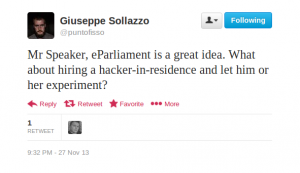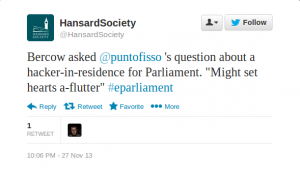Inspired by the flow of tweets coming from the #eParliament event by Hansard Society, and just on the way back from being a judge at the Land Registry Open Data Challenge, I tweeted about an old idea of mine: that of a hacker-in-residence at the Houses of Parliament.
 I had some interesting responses to this, and someone even asked Mr Speaker what he would think about it.
I had some interesting responses to this, and someone even asked Mr Speaker what he would think about it.
 However, some of the most common questions or comments I received asked
However, some of the most common questions or comments I received asked
- if a hacker in the houses is going to break anything
- if a hacker in the houses is going to replace or, worse, be in competition with the current IT staff
- if a hacker in the houses will have to deliver specific results under direction from the parliamentary ICT management
and so on.
These questions suggest a general failure to understand the general concept of a hacker-in-residence (or, more likely, my failure to explain it), a concept that has been experimented with by many other institutions in the past few years. Medway Council are hiring a geek-in-residence, for example; the Australian Government offers funding to Arts Organisations that want to hire one.
To me, these questions are simply missing the point: a hacker-in-residence is not your standard IT person. The goal of hiring a hacker in residence are, actually, opposite to that and only a blind management would want to get just-another-IT-guy.
A hacker-in-residence is akin to an artist.
The idea is to get a person that responds to ideals of independence, creativity, tinkering, and liberal experimentation; this person should be hired for a limited period of time, and be left to play with things. This is what a hacker is meant to do.
A hacker-in-residence, in other words, should not be a corporate animal; “Reporting to management” shouldn’t be part of his or her vocabulary; competition with current IT staff should not take place, as their goals and targets are different: a hacker-in-residence, differently from IT staff, is not mandated to return any deliverable at the end of their tenure.
The hacker-in-residence, in other words, is tasked with approaching freely and creatively ordinary problems and suggest alternative ways to attack them.
When I say this role is similar to that of an artist, I’m actually talking from experience. During my time as a research fellow at UCL, the institution hired an artist-in-residence.
The artist-in-residence would simply walk around the building, talk to researchers, academics and students; watch over their daily problems, learn about their research projects, see their outcomes; and, eventually, produce art inspired by these experiences.
A hacker-in-residence should just do the same.